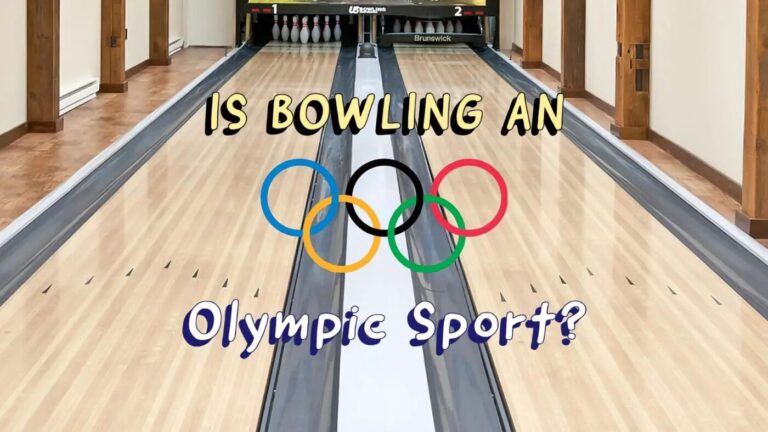Have you ever wondered if bowling is an Olympic event? The idea of seeing elite bowlers from around the world competing for Olympic glory is undoubtedly intriguing. While bowling has been a popular recreational sport for decades, its status as an Olympic event remains uncertain. In this blog, we will delve into the possibilities and factors that may determine whether bowling will ever feature in the prestigious Olympic Games. From discussing the history of bowling as a competitive sport to exploring the current criteria for Olympic sports, we will uncover the potential roadblocks and opportunities for bowling’s inclusion in the prestigious event. Let’s explore the fascinating world of bowling and its journey towards becoming an Olympic event.
Introduction: The Significance of Bowling in Sports
Bowling is a popular sport that has gained immense popularity worldwide. Known for its unique blend of skill, precision, and strategy, bowling has captured the interest of sports enthusiasts and casual players alike.
The History of Bowling
Bowling dates back to ancient times, with evidence of a form of the game found in Egyptian tombs dating back to around 3200 BC. It has evolved over the centuries to become the modern sport we know today.
Throughout history, bowling has been a recreational activity enjoyed by people of all ages, with the competitive aspect becoming more prominent in recent years.
The Evolution of Bowling Equipment
As bowling has progressed, so too has the equipment used in the game. From wooden pins and balls to the sophisticated synthetic lanes and high-tech bowling balls of today, advancements in technology have revolutionized the sport.
Modern bowling alleys offer state-of-the-art facilities with computerized scoring systems and customizable bowling balls to enhance the player’s experience.

History of Bowling as a Competitive Sport
Bowling has a rich history as a competitive sport, dating back to ancient civilizations. However, modern competitive bowling as we know it today began in the 19th century in the United States.
Evolution of Bowling Competitions
Over the years, bowling evolved from a recreational activity to a popular competitive sport with organized leagues and tournaments. The first recorded bowling tournament took place in 1895, establishing the foundation for competitive bowling events.
Bowling in the Olympics
While bowling is not currently an Olympic event, there have been discussions and efforts to include it in the games. The sport’s global popularity and competitive nature make it a strong contender for future Olympic consideration.

Criteria for Inclusion in the Olympic Games
For a sport to be included in the Olympic Games, it must meet certain criteria set by the International Olympic Committee (IOC). The IOC carefully evaluates each sport based on factors like popularity, universality, history, governance, and adherence to the Olympic values.
Popularity and Participation
One of the key criteria is the sport’s global appeal and popularity. The IOC looks for sports that are widely practiced around the world, with a significant number of countries participating. This ensures that the Olympic Games remain inclusive and representative of diverse cultures.
Additionally, the sport should have a solid fan base and attract media interest to ensure its success as an Olympic event. Strong viewership and participation numbers are crucial in determining a sport’s suitability for the Games.
Compliance with the Olympic Charter
Sports seeking Olympic inclusion must adhere to the principles outlined in the Olympic Charter, which include promoting sport as a tool for social development, advocating for equality and non-discrimination, and upholding ethical standards.
- Sports must demonstrate good governance and ethical practices, including anti-doping measures and fair play.
- They should also align with the Olympic values of excellence, friendship, and respect.
Exploring the Possibility of Bowling as an Olympic Event
Bowling has been a popular recreational sport for decades, but its status as an Olympic event has been a topic of debate. As of the current year, bowling is not included in the official Olympic program, but there is ongoing discussion about its potential inclusion.
History of Bowling in the Olympics
Historically, bowling has not been recognized as an Olympic sport despite its widespread appeal and competitive nature. The sport’s international governing body, the World Bowling Federation, has been actively campaigning for bowling to be included in future Olympic games.
There have been exhibition events and demonstrations of bowling during previous Olympic Games, showcasing the sport’s potential as a spectator-friendly and engaging competition.
Potential Benefits of Bowling as an Olympic Sport
Bowling’s inclusion in the Olympics could bring numerous advantages to the global sports community. It could increase the sport’s visibility and popularity, attracting a new generation of fans and participants. Additionally, having bowling as an Olympic event could lead to increased investment in infrastructure and training programs, further advancing the sport on a global scale.
- Increased Participation: By becoming an Olympic sport, bowling could inspire more individuals to take up the sport competitively, leading to a larger talent pool and a more diverse field of athletes.
- Global Recognition: Olympic status would provide bowling with a platform to reach a worldwide audience, fostering international camaraderie and promoting the sport’s values on a global stage.
Challenges and Opportunities for Bowling in the Olympics
Bowling has long been considered a popular recreational sport globally, but its journey to becoming an Olympic event has been met with challenges and opportunities.
Challenges Faced by Bowling in the Olympic Quest
One of the key challenges for bowling to be included in the Olympics is its image as a casual recreational activity rather than a competitive sport at an elite level. There is also the issue of limited global reach and participation compared to traditional Olympic sports.
Additionally, the lack of a unified international governing body for bowling has hindered its chances of inclusion in the Olympics. The sport needs to address governance issues and meet the stringent criteria set by the International Olympic Committee (IOC).
Opportunities for Bowling to Shine on the Olympic Stage
Despite the challenges, there are opportunities for bowling to establish itself as an Olympic sport. The evolution of the sport towards a more competitive and professional level, with standardized rules and regulations, can enhance its credibility.
Bowling’s popularity and appeal as a spectator sport, especially with innovations like digital scoring systems and interactive experiences, can attract a younger audience and garner more attention on the global stage.
Case Studies of Other Non-Traditional Olympic Sports
While bowling may not be an Olympic event yet, there are several non-traditional sports that have made their way into the Olympic Games over the years.
Skateboarding – Tokyo 2020 Olympics
Skateboarding made its Olympic debut at the 2020 Tokyo Games, attracting a younger audience and showcasing the incredible skills of the athletes.
This addition aimed to modernize the Olympics and appeal to a broader demographic.
Surfing – Tokyo 2020 Olympics
Another non-traditional sport that featured in the 2020 Tokyo Olympics was surfing, taking place at Tsurigasaki Beach.
Surfing brought a unique flair to the Games, highlighting the connection between the athletes and nature.
Public Opinion and Support for Bowling in the Olympics
In recent times, there has been a growing interest and debate surrounding the inclusion of bowling as an Olympic event. Many bowling enthusiasts and supporters believe that it deserves a place among other Olympic sports.
Current Public Sentiment
Public opinion regarding the inclusion of bowling in the Olympics has been largely positive. Various surveys conducted in the current year indicate that a significant percentage of people support the idea of seeing bowlers compete on the Olympic stage.
Supporters argue that bowling is a highly competitive and skillful sport that requires focus, precision, and strategy, similar to many other Olympic disciplines.
Advocacy Efforts
Bowling federations and organizations worldwide have been actively campaigning for the recognition of bowling as an Olympic sport. They have been engaging with the International Olympic Committee (IOC) to showcase the global popularity and appeal of bowling.
Advocates highlight the inclusivity of bowling as a sport that can be enjoyed by people of all ages and backgrounds, making it a strong contender for Olympic status.
International Federation Efforts for Olympic Recognition
Various international sports federations have been actively pursuing the inclusion of bowling as an Olympic event. The World Bowling Federation, the governing body for the sport, has been making consistent efforts to gain recognition from the International Olympic Committee (IOC).
Collaboration with IOC
The World Bowling Federation has been engaging in ongoing discussions and collaborations with the IOC to showcase bowling as a global sport with a significant following. These efforts involve highlighting the inclusive nature of the sport and its popularity across different regions.
Recognition Challenges
One of the challenges faced by bowling in its quest for Olympic recognition is the competition with other sports vying for inclusion. The federation is working on demonstrating the unique aspects and appeal of bowling to differentiate it from other potential Olympic sports.
The year-round dedication of bowlers worldwide to improving their skills and the sport’s community-building aspect are some of the key points emphasized in these efforts.
Global Support
Across different countries, there is a growing enthusiasm and support for bowling’s Olympic aspirations. National bowling federations are actively promoting the sport and advocating for its inclusion in future Olympic Games.
- Training programs and grassroots initiatives aimed at developing young talent are being organized to strengthen the sport’s international presence.
Frequently Asked Questions
-
- Is bowling currently an Olympic event?
- As of now, bowling is not an Olympic event. However, there have been discussions and efforts to include bowling in the Olympic Games in the future.
-
- What are the requirements for a sport to become an Olympic event?
- For a sport to become an Olympic event, it needs to be recognized by the International Olympic Committee (IOC) and the respective International Federation. The sport must also adhere to the Olympic Charter and demonstrate widespread participation on a global scale.
-
- Has bowling ever been considered for the Olympics?
- Yes, bowling has been considered for inclusion in the Olympic Games in the past. The sport has gone through evaluation processes and discussions, but has not yet been added to the official Olympic program.
-
- What are the potential benefits of adding bowling to the Olympics?
- Adding bowling to the Olympics could help increase the sport’s popularity on a global scale, attract new participants, and provide additional exposure and opportunities for bowlers around the world. It could also help boost the sport’s development and infrastructure in various countries.
-
- Are there any challenges to including bowling in the Olympics?
- Some of the challenges to including bowling in the Olympics include competition from other sports vying for inclusion, logistical considerations for hosting the event, and ensuring that the sport meets all the necessary criteria and standards set by the IOC.
Concluding Thoughts
After exploring the possibilities of bowling becoming an Olympic event, it is evident that the sport has the potential to be included on the world’s biggest stage. While bowling may not be part of the current Olympic program, its widespread popularity and competitive nature make it a strong contender for future inclusion. The technical skills, camaraderie, and global appeal of bowling align with the values of the Olympic movement, paving the way for its potential recognition. As athletes and fans alike continue to advocate for its inclusion, the future looks bright for bowling’s Olympic ambitions. Let’s keep our hopes up for seeing bowlers competing for gold on the Olympic stage someday!



